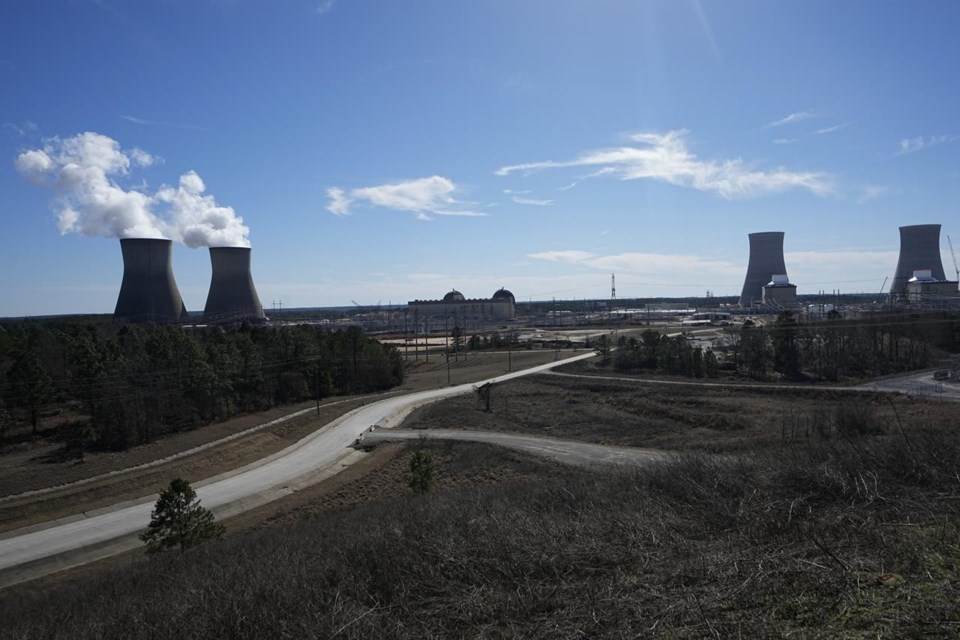ATLANTA (AP) ΓÇö The second of two new nuclear reactors in Georgia has entered commercial operation, capping a project that cost billions more and took years longer than originally projected.
Georgia Power Co. and fellow owners announced the milestone Monday for Plant Vogtle's Unit 4, which joins an earlier new reactor southeast of Augusta in splitting atoms to make carbon-free electricity.
Unit 3 last summer, joining two older reactors that have stood on the site for decades. They're the first two nuclear reactors built in the United States in decades.
The new Vogtle reactors are currently projected to cost Georgia Power and three other owners $31 billion, according to calculations by The Associated Press. Add in $3.7 billion that paid Vogtle owners to walk away from construction, and the total nears $35 billion.
Electric customers in Georgia already have paid billions for what may be the most expensive power plant ever. The reactors were originally projected to cost $14 billion and be completed by 2017.
Utilities and their political supporters on Monday hailed the plant's completion. Georgia Gov Brian Kemp proclaimed he was ΓÇ£thankful for this historic achievement by Georgia Power and its partners.ΓÇ¥ Chris Womack, CEO of Atlanta-based Southern Co., which owns Georgia Power, argues Vogtle will make the state's electrical grid more reliable and resilient and help the utility meet its goal of zeroing out carbon emissions by 2050.
ΓÇ£These new Vogtle units not only will support the economy within our communities now and in the future, they demonstrate our global nuclear leadership,ΓÇ¥ Womack said in a statement.
Each of the two new reactors can power 500,000 homes and businesses without releasing any carbon.
Even some opponents of Vogtle have said the United States canΓÇÖt achieve carbon-free electricity without nuclear power. But Georgia Power, like other utilities, plans to build more fossil fuel generation in coming years, saying demand is rising sharply. That demand, driven by computer data centers, is being felt by multiple utilities across the country.
Calculations show VogtleΓÇÖs electricity will never be cheaper than other sources the owners could have chosen, even after the federal government reduced borrowing costs by in loans.
ΓÇ£Hopefully, despite being seven years late and billions over budget, the two new units at Plant Vogtle will finally perform well for at least the next 80 years to justify the excessive cost,ΓÇ¥ said Liz Coyle, executive director of Georgia Watch, a consumer group that fought to limit rate increases.
In Georgia, almost every electric customer will pay for Vogtle. Georgia Power owns 45.7% of the reactors. Smaller shares are owned by , which provides electricity to member-owned cooperatives, the and the city of Dalton. Utilities in , as well as in the Florida Panhandle and parts of Alabama also have contracted to buy VogtleΓÇÖs power.
Regulators in December approved on Georgia PowerΓÇÖs 2.7 million customers to pay for $7.56 billion in remaining costs at Vogtle, with the company absorbing $2.6 billion in costs. ThatΓÇÖs expected to cost the typical residential customer an additional $8.97 a month in May, on top of the $5.42 increase that took effect when Unit 3 began operating.
Even as government officials and some utilities are to alleviate climate change, the cost of Vogtle could discourage utilities from pursuing nuclear power. American utilities have heeded VogtleΓÇÖs missteps, shelving plans for 24 other reactors proposed between 2007 and 2009. Two half-built . But Westinghouse is marketing the reactor design abroad. China has said it will build more reactors using the design, while Bulgaria, Poland and Ukraine also say they intend to build nuclear power stations using the Westinghouse reactor.
Jeff Amy, The Associated Press




